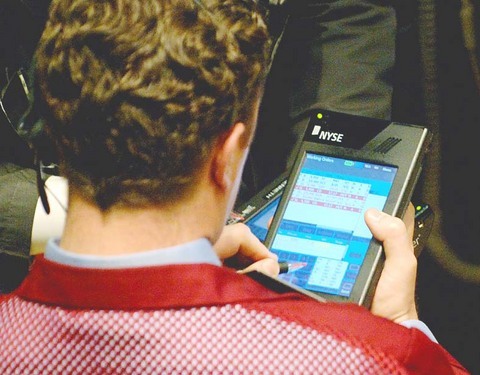Ben Bernanke, the newly installed chairman of the US Federal Reserve, suggested on Monday that the central bank will need to pay more attention to global financial conditions in setting interest rates, moving beyond its traditional focus on domestic economic forces.
In a speech to the Economic Club of New York at the Grand Hyatt Hotel in Manhattan, Bernanke said that to understand the reasons behind movements in US bond yields "an explanation less centered on the United States might be required."
In only his third speech since being sworn in as Fed chairman last month, Bernanke was also skeptical about the argument that the economy will slow in the near future, a view that many investors may take as a sign that the Fed is not quite near the end of its string of interest rate increases.

PHOTO: AP
Bernanke built the prepared text of his speech around one of the most pressing puzzles in financial markets today: Why do long-term bond yields remain so low despite steadily rising short-term interest rates?
Traditionally long-term rates have fallen when investors have anticipated a slowdown in the economy or a decline in inflationary pressures. But Bernanke argued that other factors -- including a worldwide imbalance between abundant savings and less robust investment -- may be a more powerful explanation for the current phenomenon.
Over time, however, the challenge will come in determining whether global forces are likely to push rates lower than otherwise might be the case -- or higher. The answer, Bernanke said, will be increasingly crucial to the conduct of monetary policy.
If long-term yields are low primarily because investors are buying more long-term bonds they would be adding an extra lift to consumer spending and business investment. That would tend to push the Fed to raise its key interest rate a little more than it might otherwise have considered appropriate.
"If spending depends on long-term interest rates, special factors that lower the spread between short-term and long-term rates will stimulate aggregate demand," Bernanke said.
Other things being equal, he added, this "argues for greater monetary policy restraint" and higher short-term interest rates.
On the other hand, if the low bond yields are indicating that investors expect an economic slowdown around the corner, it might require the Fed to take a different tack.
Financial investors awaited Bernanke's speech in hopes of combing it for signs of when the Fed might end its series of interest rate increases. The Fed is widely expected to raise its key rate another quarter of a point at its meeting next week, but analysts are divided over whether it will echo that increase in May.
Yet beyond discarding the notion of an economic slowdown, Bernanke refrained from providing any precise indication of what to expect from the Fed.

MORE VISITORS: The Tourism Administration said that it is seeing positive prospects in its efforts to expand the tourism market in North America and Europe Taiwan has been ranked as the cheapest place in the world to travel to this year, based on a list recommended by NerdWallet. The San Francisco-based personal finance company said that Taiwan topped the list of 16 nations it chose for budget travelers because US tourists do not need visas and travelers can easily have a good meal for less than US$10. A bus ride in Taipei costs just under US$0.50, while subway rides start at US$0.60, the firm said, adding that public transportation in Taiwan is easy to navigate. The firm also called Taiwan a “food lover’s paradise,” citing inexpensive breakfast stalls

TRADE: A mandatory declaration of origin for manufactured goods bound for the US is to take effect on May 7 to block China from exploiting Taiwan’s trade channels All products manufactured in Taiwan and exported to the US must include a signed declaration of origin starting on May 7, the Bureau of Foreign Trade announced yesterday. US President Donald Trump on April 2 imposed a 32 percent tariff on imports from Taiwan, but one week later announced a 90-day pause on its implementation. However, a universal 10 percent tariff was immediately applied to most imports from around the world. On April 12, the Trump administration further exempted computers, smartphones and semiconductors from the new tariffs. In response, President William Lai’s (賴清德) administration has introduced a series of countermeasures to support affected

CROSS-STRAIT: The vast majority of Taiwanese support maintaining the ‘status quo,’ while concern is rising about Beijing’s influence operations More than eight out of 10 Taiwanese reject Beijing’s “one country, two systems” framework for cross-strait relations, according to a survey released by the Mainland Affairs Council (MAC) on Thursday. The MAC’s latest quarterly survey found that 84.4 percent of respondents opposed Beijing’s “one country, two systems” formula for handling cross-strait relations — a figure consistent with past polling. Over the past three years, opposition to the framework has remained high, ranging from a low of 83.6 percent in April 2023 to a peak of 89.6 percent in April last year. In the most recent poll, 82.5 percent also rejected China’s

PLUGGING HOLES: The amendments would bring the legislation in line with systems found in other countries such as Japan and the US, Legislator Chen Kuan-ting said Democratic Progressive Party (DPP) Legislator Chen Kuan-ting (陳冠廷) has proposed amending national security legislation amid a spate of espionage cases. Potential gaps in security vetting procedures for personnel with access to sensitive information prompted him to propose the amendments, which would introduce changes to Article 14 of the Classified National Security Information Protection Act (國家機密保護法), Chen said yesterday. The proposal, which aims to enhance interagency vetting procedures and reduce the risk of classified information leaks, would establish a comprehensive security clearance system in Taiwan, he said. The amendment would require character and loyalty checks for civil servants and intelligence personnel prior to